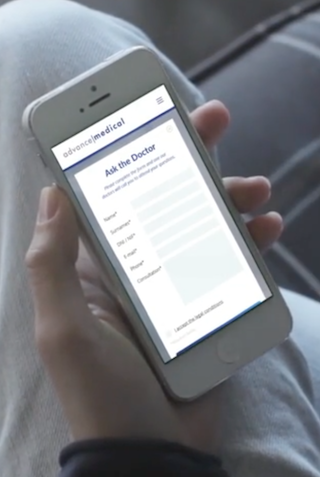 With its eyes set on a global reach, telehealth giant Teladoc announced that it was acquiring fellow virtual care platform Advance Medical for $352 million this morning. The acquisition is expected to help Teladoc expand its clinical services internationally, specifically to multinational employers, and cater to patients in more languages.
With its eyes set on a global reach, telehealth giant Teladoc announced that it was acquiring fellow virtual care platform Advance Medical for $352 million this morning. The acquisition is expected to help Teladoc expand its clinical services internationally, specifically to multinational employers, and cater to patients in more languages.
“[Teladoc provides] a full suite of services—everything from colds and coughs all the way up through cancer, cardiac conditions, and muscular and skeletal issues. In the US we provide that today and we have since the Best Doctor acquisition. But outside the US we were almost exclusively expert medical opinions,” Jason Gorevic, CEO of Teladoc told MobiHealthNews. “Advance Medical was really the mirror image of that. So outside the US they provided the full suite of clinical services but in the US they were focused on the expert medical opinion. So as a result, combining the two companies provides us with a global platform to provide a comprehensive suite of virtual care services.”
Barcelona, Spain-based Advance Medical has eight international offices including locations in China, Brazil, the US, Portugal, Hungary, the UK and Chile. The newly acquired company has the capability to provide care in 20 languages, which will now be available to Teladoc members.
Advance Medical was founded in 1999 and has more than 450 doctors on staff, according to their webpage. The platform has reached more than 125 countries and provides services in more than 20 languages. Currently the company offers behavioral care, expert medical opinion, enterprise support, global care on demand, specialty pharmaceutical management, and virtual primary care.
“It really means anywhere in the world a member of Teladoc can get access to a full suite of clinical care whether they are episodic and symptomatic at the time or whether they have or a more complex issue that requires a deep understanding of the condition and the patients’ situation,” Jason said. “What is equally important is understanding the local dynamics of the healthcare delivery system. For example, if an employee of a US multinational employer is stationed in China or is traveling to China, we not only have the the ability to deliver care in their language, we have people on the ground in China who understand the local medical delivery system and can help the members navigate through that system — where the best places to get care are and who the physicians are who can help them in their language.”
Gorevic said that the services will be geared towards multinational companies, many that are based in the US but have roughly a third of their population in other countries, and international health insurance companies that are looking to enhance medical services.
“The data shows the private health insurance market outside the US is just as big as the health insurance market in the US and is on a trajectory to double over the next few years,” Gorevic said.
This isn’t the telehealth giant's first major acquisition in the last few years. In June of 2017 the company acquired Best Doctors, a virtual medical consultation company. The company said the acquisition would enable it to have a connected care platform focused on improving outcomes for some of the most complex medical conditions. Teladoc paid $375 million in cash and $65 million in Teladoc common stock for the purchase of the company.
In addition to acquisitions, the Purchase, New York-based virtual care provider has also looked to partnerships aiming to expand its services. In February the company announced that it was teaming up with IBM Watson to launch an oncology insights program.
But Gorevic said there is a method and overall vision to these latest acquisitions and partnerships.
“[The Advance Medical acquistion] is 100 percent in line with our vision, which is to transform how consumers access healthcare all around the world. And to do that we believe very strongly … that the best way to accomplish that is through a global comprehensive virtual care platform. When I say comprehensive that means adding clinical services all along that spectrum of healthcare from episodic, symptomatic-but-otherwise-well patient to the chronically ill or complex patient that may or may not have co-morbidities,” Gorevic said. “So the IBM Watson partnership is a great example of leveraging advanced technology and analytics to supplement what the physicians can do. So in that case, for example, IBM Watson is able to track all of the clinical trials going around all over the world and match patients to those clinical trials, which would be impossible for any physicians to keep track of themselves.”
As for its place in the healthcare market, Gorevic said the company has a unique spot.
“I think it is worth noting that in a landscape of many many single market point solutions, Teladoc stands alone as the only global comprehensive virtual care platform,” Gorevic said. “There are a lot of narrow providers of Telehealth in single markets around the world but there is nobody who operates across geographies and can offer a single solutions for a large multinational employer.”















